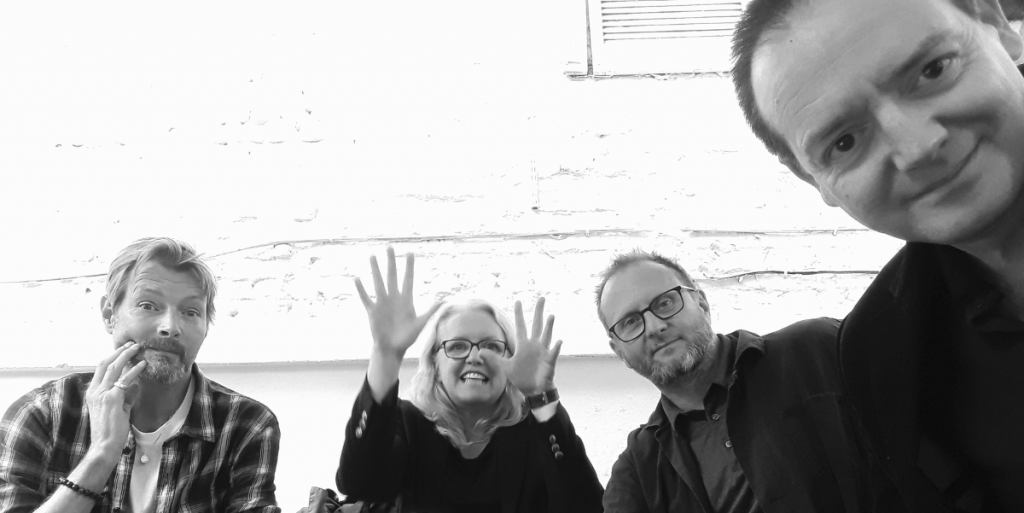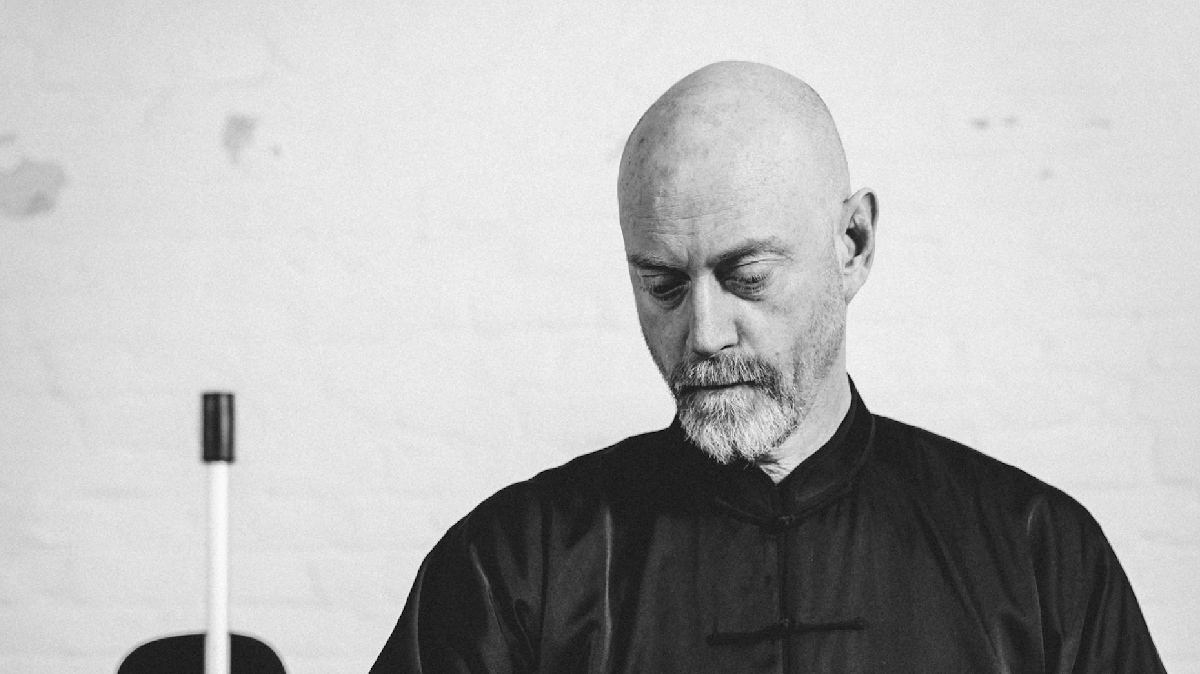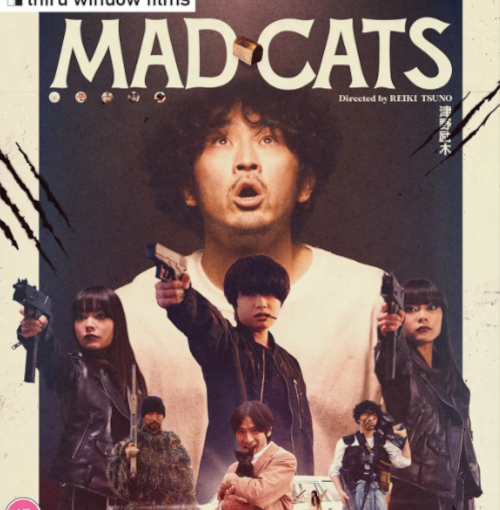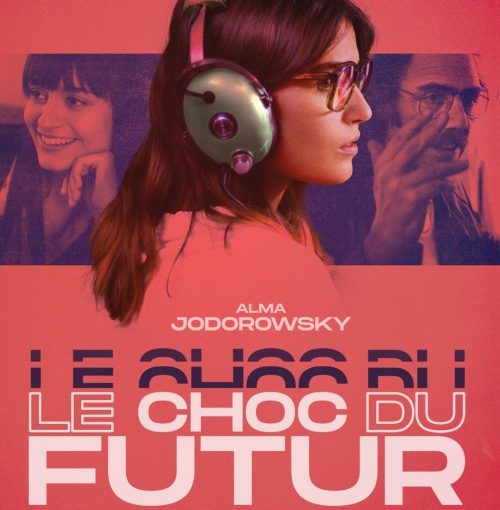
Preceded by the “Chateau” single earlier this month, unconventional musical subversives R.O.C return with their first album in twelve years, Bile And Celestial Beauty, appearing on rocmusic on 29 March. Oleg Rooz has created seven short films to go with the album, and his video for the track “Divorce”, which is released this Friday (15 March) and receives its exclusive premiere below, accompanies an interview with Mr Olivetti.
Where on Earth have you been for the last twelve years? We had all but given up hope…
FRED: Antigua, Atlanta, Barbados, Bermuda, Cancun, Dallas, Edinburgh… stop me before I get to Zurich!PATRICK: My last 12 years contain: loss, vulnerable humans, moving home, touring with other artists. Bereavement, crisis, upheaval, endurance and pleasure. All you need for a record!
KAREN: Most of that time being a “slave to the rhythm” working in finance.
Considering the duration between releases, what keeps you all entertained when not making music?
KAREN: when I wasn’t working long hours, I’d either be up in Scotland or travelling somewhere for an adventure of some sort. Anything involving nature, art, books, history, music, film. The usual stuff.PATRICK: See my answer above. In retrospect, some of the most difficult stuff is the most entertaining. But not all of it.
FRED: Madden
DANTON: Making other peoples music in as many genres and as many different locations as possible.
Is R.O.C enough to satisfy your musical cravings or do you have any other outlets that take place during the downtime?
FRED: It’s enough for now!KAREN: I have been playing a little bit with ambient group Animal Object in Denver, Colorado. I joined them for a few songs with The Violent Femmes last summer at the VF’s Denver Botanical Garden gig. I’ll join AO again for a radio spot on KGNU Boulder and the Fort Collins Music Festival in late April. I enjoy the freedom of improv/ambient/noise. Really not too far removed from how we approach R.O.C at times.
PATRICK: Mark Eitzel got in touch, raving about one of our songs. I ended up touring Europe playing piano for him. I do the same for Larry Love from Alabama 3. Just playing is good, like a stowaway. Both spontaneous artists, no rigid script — otherwise I couldn’t do it.
DANTON: I think part of what makes R.O.C so eclectic is everybody having so many other diverse interests; however I do think, given the chance, we could spend the whole time immersed in R.O.C..
R.O.C seems to exist outside current styles. Is there anything happening at the moment that had any influence on the making of this album?
FRED: No.
PATRICK: As with our previous records real life, personal and political, appears, literally in the music — phone messages, TV, unexpected chimes with current events.
I think our unconscious plan is “let it happen”.
Why is everyone still looking for categories? Is Get Out horror or comedy? Spotify playlists, awful: I heard one called “Upbeat Dinner Party” — where’s “Family Argument” or “Martial Law”?
DANTON: I was drawn to R.O.C in the first place by it not following any trend. Zero rules. I also think the fact it can’t be pigeonholed made it a little difficult to market in the traditional label way, but that no longer matters.
It always seemed as though there was a slight counterpoint between the frustration of Fred’s vocals and the cool of Karen’s, but on this album there seem to be a few vocal collaborations. Did anything particularly prompt this?
FRED: You know, it was never meant to be like that, it just sort of devolved into a bit of a stereotype. I like the way we merge with some of these.KAREN: I’ve always liked the idea of harmonies. I think Fred and Patrick got sick of me saying it. So we finally did it. It adds layers.
DANTON: They are so polarised in style, but I’m not sure, now they have been together on tracks, why it has taken so long. As a listener, you are really pulled about by the different emotions they both invoke.
PATRICK: I definitely wanted more songs with both voices. They’re completely different, so it’s fun to put them together.

Are the ideas for the tracks started by individuals and then brought to the rest, or do you hang together in the studio and wait for the magic that clearly exists between you to unfold?
KAREN: It happens in all sorts of ways, sometimes a lyric, sometimes a riff, sometimes hanging out playing together, always different. No fixed routine or method.FRED: Every which way but loose!
PATRICK: I like how things come of out of nothing. They just evolve as demos, sometimes really quickly, sometimes over years. Never has someone “brought a song” and we’ve learnt it.
DANTON: I have always wondered from what strange and questionable places they emerge, but they always evolve once thrown into the band environment. Trying to stick them together is part of my remit, I guess.
Are there ever any ideas left over from recording sessions, lurking under beds on tape awaiting a R.O.C unreleased box-set?
KAREN: Yes! We have lots of tapes.DANTON: I would guess at thousands.
FRED: I hope so. There must be. Somewhere!
Although he has worked with you for many years, what has Danton brought to the group as the fourth member after so long as a trio?
KAREN: He’s brought fresh air into the room so to speak. Fred, Patrick and I can follow certain patterns of thought etc… which is fine, but now and again need to be shaken up. Danton has brought new energy, and is now “in”, so to speak, so I think he is approaching the involvement within the band slightly differently to how he might have done so before [as producer].PATRICK: From our first album on Setanta, through Virgin and beyond, Danton was lifting the ideas from demo-state into a lush cinematic listen. I remember on “Dada” from our album Virgin, Danton was single-handedly wrestling this deafening wall of noise into something dramatic — while we lay on sofas outside watching Jerry Springer.
We’re not a nice pro band delivering pro takes, and then following some mix template through an album. We’re the opposite, we want drama: sweet, horrible, etc. Danton always closed it out for us, and personally I came to appreciate the mix skills more and more. You can write potentially powerful music, but it needs realisation. On this album we weren’t present during mixing at all, he was moving things back to front, etc..
With the current demand for digital streaming, do you still feel affection for the physical format?
KAREN: Only vinyl. It has its own beauty and ritual. You can get lost in an album cover, its art work, its credits, info about studios, etc… you can dream. I haven’t had the same experience from any other physical format.FRED: Obviously as it’s what we grew up with. Something tangible! Like a book. I’m all for the convenience of a Kindle, or Spotify, but it’s nice to have that physical contact. I’ll still buy hard copy of something I really like rather than just the download.
PATRICK: For me buying the physical LP is my act of faith in the artist as my representative. Putting it on the record player is a ritual, and a commitment to listening through. But I use Spotify and YouTube all day too…
DANTON: I love vinyl, for the size of the artwork as well as the sound, but anything physical using digital seems a terrible waste.
Will we have to wait another twelve years for album number five?
KAREN: I hope not.PATRICK: If you pay us we’ll bash one out by May. Could be amazing.
FRED: I hope I’ll be dead by then!
DANTON: I hope not. I need it in my life.
Thank you all, and we’re looking forward to the release of Bile And Celestial Beauty eagerly.
R.O.C play an album launch show on 11 April at Whirled Cinema in Brixton, London.



